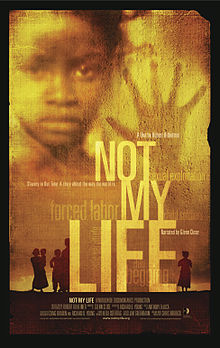Not My Life
Not My Life is a 2011 American independent documentary film about human trafficking and contemporary slavery. The film was written, produced, and directed by Robert Bilheimer, who had been asked to make the film by Antonio Maria Costa, executive director of the United Nations Office on Drugs and Crime. Bilheimer planned Not My Life as the second installment in a trilogy, the first being A Closer Walk and the third being the unproduced Take Me Home. The title Not My Life came from a June 2009 interview with Molly Melching, founder of Tostan, who said that many people deny the reality of contemporary slavery because it is an uncomfortable truth, saying, No, this is not my life.
Not My Life is a documentary film about human trafficking and contemporary slavery. It addresses many forms of slavery, including the military use of children in Uganda, involuntary servitude in the United States, unfree labor in Ghana, forced begging and garbage picking in India, sex trafficking in Europe and Southeast Asia, and other kinds of child abuse. The focus of the film is on trafficking victims, especially women and children, the latter of whom are often betrayed by adults that they trust. The film also focuses on the people and organizations engaged in working against human trafficking, including members of the Federal Bureau of Investigation FBI, Free the Slaves, Girls Educational and Mentoring Services GEMS, International Justice Mission IJM, the Somaly Mam Foundation, Terre des hommes, Tostan, UNICEF, United Nations Office on Drugs and Crime UNODC, and the United States Department of State US DoS. Not My Life has been called a cautionary tale. It depicts the commodification of millions of people and identifies the practices of traffickers as undermining international economics, security, sustainability and health.Not My Life calls attention to the fact that, in the United States, the sentencing for human trafficking is less severe than for drug trafficking. The film indicates a relationship between contemporary slavery and globalization. It asserts that most human trafficking victims are children, although the filmmakers have recognized the fact that millions of adults are also trafficked. The film depicts human trafficking as a matter of good and evil, provides interviews with survivors of human trafficking, and presents analysis from antitrafficking advocates. Throughout the film, Robert Bilheimer encourages viewers to personally combat human trafficking. Bilheimer was sparing in his use of statistics in the film, feeling that overloading viewers with figures might numb them to the issues. ........
Source: Wikipedia

